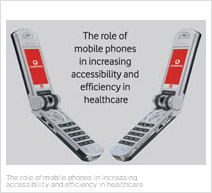The medical uses of mobile phones show they can be good for your health
26 March 2006 by axxxr Vodafone Group has recently published a report that shows how current mobile technology can increase productivity, improve patient health and enable greater access to healthcare.
Mobile technology has the potential to support Governments in their attempts to drive efficiency in healthcare costs (1) and improve overall levels of service. The Role of Mobile Phones in Increasing Accessibility and Efficiency in Healthcare contains new research by Imperial College's Tanaka Business School in association with NHS Direct, the University of Dundee and the Office of Health Economics Consulting. This report is the first time that mobile's contribution to healthcare has been systematically reviewed. It demonstrates benefits to patients through text message (SMS) self-care programmes and highlights efficiency gains in healthcare delivery. Key findings include: * Potential savings of between £240-370 million a year to the NHS in England alone by the introduction of SMS appointment reminders to patients (2) * Improvement in glucose levels of 10% for young people with diabetes who manage their condition using a SMS support system. This level of improvement can potentially reduce diabetes related complications such as blindness by 76% and kidney disease by 50% * Potential cost savings of up to £1.9 million per 1000 patients if a SMS support system is introduced into treatment programmes for tuberculosis (TB) patients. The SMS support system also leads to a reduction in deaths Alan Harper, Director of Vodafone Group Strategy, said: "Mobile epitomises the essential requirements for the transfer of health information: privacy, confidentiality, timeliness and direct personal communication. We recognise that mobile is not the panacea for all challenges in the healthcare sector but, with penetration rates of over 90% for 15 to 44 year olds in the UK, it does have an important role to play in helping transform service provision." Dr Rifat Atun, Director of the Centre for Health Management at Tanaka Business School, said: "This report has many examples of how mobile can increase efficiency, improve patients' ability to monitor and self-manage chronic conditions, and promote better adherence to drug treatment. All of this is delivered using basic mobile applications, voice and SMS, and achieved at minimal additional cost. Healthcare policy makers and commissioners must introduce mobile systematically within healthcare if we are to take full advantage of its potential." Dr Mike Sadler, Medical Director of NHS Direct, concluded:"NHS Direct has revolutionised patient access to the NHS. Mobile is playing an important part in this. We know that the use of mobile in healthcare is acceptable to the public, and the benefits are available now. However, it is under-utilised at present. This report brings together a number of different studies and shows how mobile offers genuine opportunities to address the challenges of healthcare in the 21st century." The Role of Mobile Phones in Increasing Accessibility and Efficiency in Healthcare - full report (PDF 1.24MB) Comments On 30 Mar 01:18 Glen wrote I have done lots of research on the net and found that some say that cell phones causes damage to children under 16 brains, it develops tumors (cancer ones) and other behavior problems in young children, the risk is much less for adults, others say there is no real proof that these ever happen with newer cell phones... On 27 Mar 11:30 Amricos wrote These mobiles will never be good for health...i suffered a lot with my old S-55 especially when i put it near to my heart..!!! i can't imagine that patients should use mobile phones since they r patients..!! |








 RSS feed
RSS feed